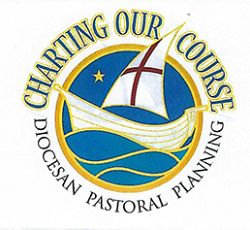Parishes continue implementing Pastoral Plan
SALT LAKE CITY — In 2018, a year after coming to Utah, Bishop Oscar A. Solis issued a Pastoral Plan that outlined goals for the diocese. Implementation of the plan, intended to be a five-year process, was interrupted by the pandemic, but parishes and missions are continuing to identify ways in which they are fulfilling the goals of faith formation, vocations, stewardship, the Eucharist and Catholic identity, and dignity of the human person.
At the Nov. 25 Diocesan Fall General Assembly, Bishop Oscar A. Solis met via Zoom with parish, mission and diocesan leaders to discuss the Pastoral Plan process. Previous meetings on the same topic have been held each quarter for the last year or more.
“It is a continuous journey of listening and talking to one another,” Bishop Solis said, adding that he encourages pastors to invite their parish and ministry leaders to discuss how they “put into effect the priorities of our diocese in its mission of evangelization in the local Church of the Diocese of Salt Lake City.”
Guiding the discussion was Dominican Father Wayne Cavalier, a consultant from the Congar Institute for Ministry Development who has been involved with the Pastoral Plan process from the beginning.
At the last meeting, the parishes were asked to identify what makes a vibrant and welcoming parish or mission, how they will keep the Pastoral Plan a living document, and how they can help increase a local sense of ownership and belongingness in the Pastoral Plan.
One point of discussion was having a shared mission among diverse parish communities. Parishes had replied to this issue with comments such as that having everyone working together to accomplish a common goal fosters a sense of unity when different viewpoints are respected. This leads to a commitment to stewardship through genuine interest, personal invitation, encouragement, praying for and with each other, and a safe space where people are embraced.
For the plan to live in the lives and hearts and minds of the community members, it has to be communicated to them, one response said.
Another comment was that the parish/mission community has a vibrant liturgy that builds up the body of Christ, which feeds and nourishes its members to do the work of discipleship during the week. “I love that because it talks about the sense of being nourished by the Body of Christ as the Body of Christ, to go forth as the Body of Christ in mission together,” Fr. Cavalier said.
Of the three comments regarding mission, all mentioned that a shared vision led to leaders coming forth to use their gifts to contribute to the community, Fr. Cavalier said.
Addressing evangelization, parish leaders said there was a need to be “increasingly aware of Christ’s presence in and among us,” expressed in concrete ways such as hospitality, friendship, charitable outreach, and living out their God-given calling.
Summarizing this, Fr. Cavalier said the message was “to be evangelized, to accept and to be moved and to be transformed by that charismatic message and become evangelizers toward others.”
Some ideas for building a vibrant community included having liturgical ministers greet people as they enter the worship space, having a routine that makes attendance easier for busy families, encouraging a monthly outreach program to help the poor in the community, taking Communion to those who are sick or homebound, and being aware of parishioners with disabilities or medical issues.
To maintain the Pastoral Plan as a living document, parish leaders suggested encouraging a mindset that embraces change and continuous improvement, and frequently revisiting the plan as new goals are defined.
Fr. Cavalier agreed, saying parishes will need to “analyze and learn from areas where the plan did not meet its goals, using these lessons to inform future updates.”
These updates should answer the questions, “Where is God calling us from here? What does God call us to in response to this?” he said.
Other suggestions included keeping a record of the changes made to the plan and the reasons for these changes, as well as unachievable ideas and goals, and pitfalls. As new ideas come up, “we can ask, ‘How do they tie into our goals?’ This can help us … guide the parish and discern what to do and what not to do,” Fr. Cavalier said, adding that parishes should celebrate the successes achieved through the plan.
Sharing the plan with community members is important, he said, as is sharing ideas among parishes.
The Pastoral Plan process will continue, with parishes and missions being asked to answer whether they are satisfied with where they are currently with the implementation of the Pastoral Plan. They also have been asked to identify the biggest challenge to pastoral planning they’ve encountered so far and how they tried to overcome it. In addition, they were asked to describe two examples of success with pastoral planning that they have experienced. The answers to these questions will be discussed at the spring meeting.
© Copyright 2025 The Diocese of Salt Lake City. All rights reserved.


Stay Connected With Us